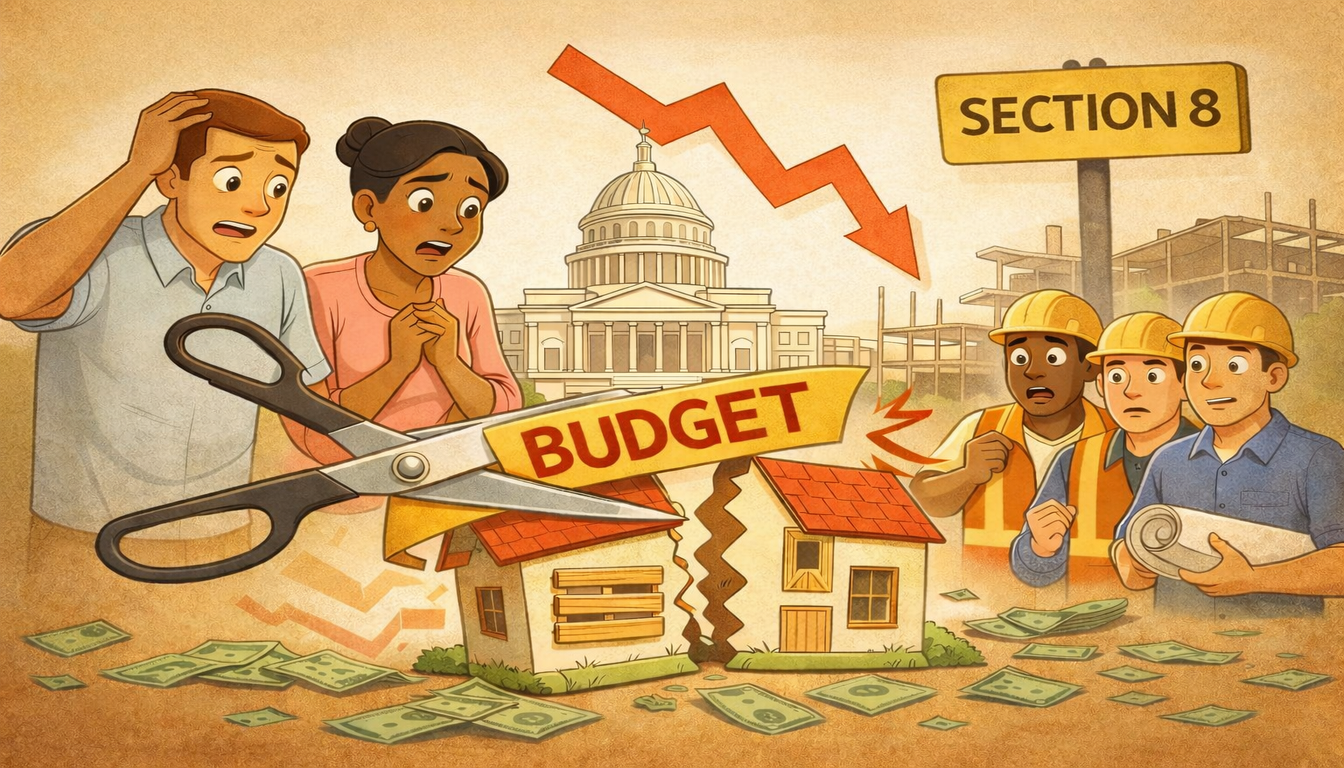
Affordable housing feels like a nightmare to secure. The whole process is like a maze, especially if you depend on Section 8 vouchers. Section 8, or the Housing Choice Voucher Program, is a federal aid program where low-income families, the elderly, and the disabled receive support to access decent, safe, and clean housing. But how do you locate landlords who are willing to accept these vouchers? This is a question that plagues a lot of individuals. This guide tries to break it down for you. We take you step by step through the process of finding Section 8 landlords. This is meant for anyone looking for housing!
Understanding Section 8 Housing Vouchers
Section 8, officially known as the Housing Choice Voucher Program, is a federal initiative. It's designed to assist low-income families, the elderly, and the disabled in securing affordable housing. The program is administered by the U.S. Department of Housing and Urban Development (HUD). It provides eligible individuals and families with vouchers that can be used to pay a portion of their rent. The value of the voucher is determined by a number of factors, which generally include family income, family size, and the rental market in the area.
Some quick facts about Section 8:
- They can be used for any housing that meets the program's standards.
- The tenant pays the difference between the actual rent charged by the landlord and the amount subsidized by the program.
- The vouchers go with the tenant, meaning they can be used anywhere in the U.S. where a public housing agency (PHA) administers a voucher program.
The Role of Public Housing Agencies (PHAs)
Public Housing Agencies play a vital role in the Section 8 program. They are who handles the local administration of vouchers. Federal funding by HUD is received by PHAs. In turn, they utilize the funds to manage the voucher program within their jurisdiction. They also maintain a waiting list of eligible applicants. As vouchers become available, PHAs will contact applicants at the top of the list.
Benefits for Tenants and Landlords
Section 8 vouchers offer numerous benefits for both tenants and landlords. For tenants, the program provides an opportunity to secure safe, decent, and affordable housing.
Here are some key benefits for tenants:
- Reduced rent burden: Tenants typically pay 30% of their income towards rent, with the voucher covering the rest.
- Choice of housing: Tenants can choose any housing that meets the program's standards, including privately owned homes and apartments.
Accepting Section 8 vouchers for landlords can offer a steady stream of reliable income. Here are some advantages for landlords:
- Reliable payments: A portion of the rent is paid directly to the landlord by the PHA each month.
- Larger pool of potential tenants: By accepting Section 8 vouchers, landlords can attract a wider range of tenants.
- Potential tax benefits: In some areas, landlords may be eligible for tax credits for renting to low-income tenants.
Step-by-Step Guide to Finding Section 8 Landlords
With the right strategy and tools, finding landlords who accept Section 8 voucher can be quite simple. Below are the steps to help you:
- Utilize HUD Resources
- Contact Local PHAs for Listings
- Use Section8Search.org
- Leverage Networking and Community Resources
Step 1: Utilize HUD Resources
The HUD website is helpful in guiding how to find Section 8 landlords. One can look through a searchable database to view if the listing accepts vouchers, then get choices and use the location, size, and cost filter. This will allow you to more easily find those properties that will meet your particular needs.
Step 2: Contact Local PHAs for Listings
A local Public Housing Agency may be the next best contact. They usually have lists of landlords operating in the region who are willing to receive Section 8 vouchers. Don't hesitate to reach out to them for assistance. They can provide valuable information and guidance in your search.
Step 3: Use Section8Search.Org
Section8Search.org is a one-stop resource for all of your affordable housing needs. From finding you your local PHAs, to guides on how to apply for Section 8 housing, and helping you with how to find Section 8 landlords and how to find landlords that accept Section 8, we have everything you need to give yourself the best chance at Section 8 approval. After you finish this article, make sure to go to enter your ZIP Code to find all the housing resources near you!
Step 4: Networking and Community Resources
Networking can be a very powerful weapon in your Section 8 housing search. Other possible resources you could utilize could be local housing advocates, other various non-profit organizations, and community groups. These might be able to get you in touch with landlords who actually take Section 8 vouchers. They could also offer you support and advice as you maneuver through the housing system.
Contacting Potential Section 8 Landlords
Once you have a list of potential landlords, you want to be appealing and persuasive when you contact them! This means explaining your case so that any misgivings the landlord has for the Section 8 program can be addressed adequately and clearly. After all, landlords might have some reservations about the tenants in the Section 8 program. It is important to dispel myths and show the advantages of Section 8.
Being Prepared
Make sure when you apply that everything is already in order for the landlord, and you've taken all steps ahead of time to make it as seamless as possible for them. Have your pay stubs, bank statements, rental history, and any other document at the ready. Make sure to already have a rental insurance policy in place as well. It's extremely tough to find a landlord who will rent without the applicant having renters insurance, and not having it is a common reason for application denial.
Common Misconceptions and Concerns held by Landlords
There are a lot of misconceptions about Section 8 tenants. They might feel they are more likely to damage things or less likely to pay the rent. But these issues should be dealt with in advance. Inform them about the built-in protections with regular inspections and a guaranteed rent check. This can help put their mind at ease and make them more accepting of Section 8 vouchers.
Rights and Responsibilities in Section 8 Housing
Being a Section 8 tenant, it is important on both sides to really understand all rights and responsibilities, as knowledge is empowerment in making any rental experience a clearer and easier one. Tenants should learn and understand the lease terms, keep the unit in good condition, and report any changes in income or household size. This translates into maintaining the property to HUD standards, accepting fair market rent, and dealing fairly with tenants.
Tenant Rights and Responsibilities
Section 8 provides you, as a tenant, with the right to safe and decent housing. You also have the right to be treated fairly and without discrimination, but you also have responsibilities. Some of these are paying your share of the rent on time, keeping the property clean, and reporting any changes in your income or family size to your PHA.
Landlord Rights and Responsibilities
Landlords in the Section 8 program also have rights and responsibilities. They have the right to receive timely payments from the PHA and to enforce the lease agreement. HUD is supposed to Ensure the property meets its housing quality standards and also must treat all tenants—be they Section 8 participants or not—fairly.
Overcoming Challenges in Section 8 Housing
Section 8 rentals can be hard to find in hot housing markets but with a little legwork, and creative thinking, you will likely find a landlord who will accept your voucher. Knowing the local housing market and being an active participant in your search are important pieces in order to increase success rates. It is also important to remain patient and persistent, because this can take time.
Dealing with Competitive Markets
Section 8 rentals can be hard to locate in competitive markets. But, don't be discouraged. Being proactive in your search and utilizing all available resources can increase your chances of finding a suitable property. Remember, in a competitive market, persistence is key. There are also times when other landlords don't really see the broader perspective of taking Section 8 renters, so as a social worker, address these potential prejudices and advocate for your clients. Certainly, education about the benefits of the Section 8 program will help in gaining landlord cooperation. Highlighting your client's strengths and commitment to being a responsible tenant can make a difference as well.
Finding a Section 8 landlord is hard; so, find a landlord resource and be well-equipped in order to perform this process well. Be patient, persistent, and proactive. Finding local housing agencies, nonprofit organizations, and online platforms like Section8Search.org that focus on affordable housing can also be quite useful in trying to find the extra help that may be needed. These resources will provide invaluable support and information to help you move through the Section 8 housing process successfully.
Navigating the Section 8 housing process can feel overwhelming, and that's where Section 8 Search comes in. We're more than just a listing website; we're a dedicated resource designed to make finding housing under the Housing Choice Voucher Program straightforward and stress-free. Our platform offers user-friendly tools to explore listings and waiting list statuses nationwide, all built on official HUD data. We're also passionate about providing clear, helpful information and guidance, empowering you with the knowledge you need to understand eligibility, complete your application, and confidently navigate your housing journey.








.png)
.png)
.jpg)



.png)
.png)
.png)



